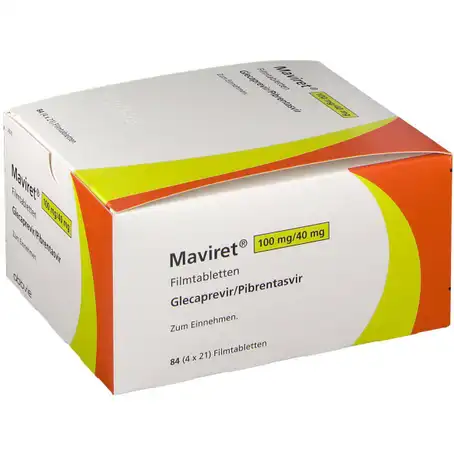Introduction to Mavyret
Mavyret Tablets is an antiviral medication primarily prescribed for the treatment of hepatitis C, a viral infection that attacks the liver and can lead to serious health complications if left untreated. The formulation of Mavyret combines two active ingredients: glecaprevir and pibrentasvir. Together, these components work synergistically to inhibit the replication of the hepatitis C virus, making Mavyret Tablets an essential option in the growing array of antiviral therapies available today.
This medication is classified within a group of drugs known as direct-acting antivirals (DAAs). DAAs have revolutionized hepatitis C treatment over the past decade. They target specific stages of the hepatitis C virus life cycle, which typically results in higher efficacy rates and shorter treatment durations compared to previous therapies. Mavyret offers a once-daily treatment regimen, which enhances patient compliance and improves overall treatment outcomes.
The significance of Mavyret in the treatment landscape cannot be overstated. With the rising prevalence of hepatitis C globally, effective therapies are crucial for managing and ultimately eradicating the virus. Mavyret has demonstrated high cure rates across different genotypes of hepatitis C, making it a versatile choice for many patients. Notably, it has also been evaluated for its potential to treat individuals with cirrhosis and those who are co-infected with HIV.
As with any medication, understanding the uses, proper dosage, and potential side effects of Mavyret is crucial for anyone considering this treatment option. By providing a comprehensive overview of Mavyret Tablets, we can facilitate informed discussions between healthcare providers and patients, ensuring that those affected by hepatitis C receive the most appropriate care and support throughout their treatment journey.
How Mavyret Tablets Works
Mavyret Tablets are a combination medication that plays a pivotal role in the treatment of hepatitis C virus (HCV) infections. It consists of two active ingredients, glecaprevir and pibrentasvir, each targeting different aspects of the viral life cycle. Understanding the mechanism of action of Mavyret Tablets can provide insights into how it effectively interferes with the replication of the hepatitis C virus.
Glecaprevir is a protease inhibitor that specifically targets the NS3/4A protease enzyme of HCV. This enzyme is essential for the virus as it cleaves the newly synthesized polyprotein into functional viral proteins. By inhibiting this enzyme, glecaprevir effectively prevents the virus from replicating and producing new viral particles, thereby reducing the viral load in the body. The inhibition of protease activity is crucial for achieving a sustained virologic response, which is the ultimate goal of hepatitis C treatment.
Pibrentasvir, on the other hand, is an NS5A inhibitor that targets the NS5A protein, which is instrumental in the replication and assembly of the hepatitis C virus. This component of Mavyret inhibits the replication of the viral genome and the production of infectious particles. By disrupting this crucial stage of the viral life cycle, pibrentasvir further complements the action of glecaprevir, enhancing the overall effectiveness of Mavyret Tablets in eliminating the virus.
The synergistic action of glecaprevir and pibrentasvir in Mavyret allows for a comprehensive attack on the hepatitis C virus. This dual mechanism not only helps in achieving a rapid reduction in viral load but also contributes to a higher likelihood of achieving a sustained virologic response. As a result, Mavyret is recognized as a highly effective treatment option for individuals suffering from chronic hepatitis C infection.
Indications for Mavyret Tablets Use
Mavyret Tablets, a combination of glecaprevir and pibrentasvir, is indicated for the treatment of chronic hepatitis C virus (HCV) infection. Specifically, Mavyret is effective against multiple HCV genotypes, notably genotypes 1 through 6, making it a versatile option for patients around the globe. This medication is particularly beneficial for the treatment of naive patients who have never initiated HCV treatment before, as well as those with previous treatment experiences, including those who have relapsed or failed with other therapies.
Diverse patient populations may benefit from Mavyret’s favorable profile. For instance, those with compensated cirrhosis or other liver-related complications can also be prescribed Mavyret Tablets, providing a streamlined approach to manage both hepatitis C and associated liver conditions. Furthermore, clinical studies indicate that Mavyret successfully achieves sustained virological response (SVR), which is essentially the absence of detectable HCV in the blood following treatment completion, in a significant percentage of patients across all the aforementioned demographics.
Moreover, Mavyret does not necessitate ribavirin and can be administered for a shorter duration, typically ranging from 8 to 16 weeks, depending on the specific characteristics of the patient’s HCV infection, including the viral load and the patient’s genotype. This simplification of treatment regimens represents a considerable advancement in the management of hepatitis C, promoting adherence and minimizing the burden of long-term therapy. Hence, Mavyret Tablets are aptly positioned as a first-line therapy for individuals across the spectrum of HCV severity, allowing for a more effective and patient-friendly approach in the fight against hepatitis C.
Dosage Guidelines for Mavyret Tablets

Mavyret Tablets (glecaprevir/pibrentasvir) is an antiviral medication prescribed for the treatment of hepatitis C virus (HCV) infection. The established recommended dosage for adults is three tablets taken orally once daily with food, consisting of 100 mg of glecaprevir and 40 mg of pibrentasvir. This regimen is crucial for maximizing the effectiveness of the treatment and ensuring viral suppression.
For individuals with renal impairment, the dosage guidelines may differ. While Mavyret is generally well tolerated in patients with mild to moderate renal impairment, those with severe renal impairment or end-stage renal disease (ESRD) are cautioned, as the safety and efficacy of Mavyret in this population have not been adequately established. Therefore, it is essential for healthcare professionals to evaluate renal function before prescribing Mavyret, and adjustments may be necessary to ensure optimal dosing for these patients.
Adhering strictly to the prescribed regimen is a cornerstone of effective treatment outcomes. Inconsistent intake of Mavyret can lead to reduced efficacy, potential drug resistance, and treatment failure. Patients are encouraged to follow guidelines, such as taking Mavyret with food consistently at the same time each day. This not only aids in maintaining drug levels within the therapeutic range but also improves the overall treatment experience. Regular follow-up appointments and monitoring can further support adherence to the regimen and allow healthcare providers to address any concerns or complications that may arise during the treatment course.
In conclusion, understanding the dosage guidelines for Mavyret Tablets, including special considerations for specific patient populations, is essential for achieving successful treatment outcomes. Patients must communicate openly with their healthcare providers to ensure the best possible results from this antiviral therapy.
Administration and Storage of Mavyret Tablets
Mavyret is an antiviral medication indicated for the treatment of chronic hepatitis C virus (HCV) infection. Proper administration of Mavyret is crucial for maximizing its therapeutic effects and ensuring patient safety. The tablet should be taken orally, and it is recommended to consume it with food. Taking Mavyret with food can enhance absorption, which helps achieve optimal drug levels in the bloodstream. This dietary consideration is important as it may affect the efficacy of the treatment.
Patients should adhere closely to their prescribed dosage regimen, which typically involves taking Mavyret once daily for a specified duration determined by their healthcare provider. It is essential not to alter the dose without consulting a medical professional, as this may hinder treatment outcomes or increase the risk of side effects. Additionally, if a dose is missed, patients should take it as soon as they remember, unless it is almost time for the next dose. In such cases, the missed dose should be skipped, and the regular dosing schedule should be resumed. Doubling up on the dose to compensate for a missed one is not recommended.
Storage guidelines are equally important in maintaining the medication’s integrity. Mavyret Tablets should be stored at room temperature, away from moisture and heat. The ideal environment is a cool, dry place, such as a cabinet or drawer, and it should be kept out of reach of children. Patients should avoid storing Mavyret in the bathroom, where humidity levels can fluctuate. As with all medications, it is critical to periodically check the expiration date and dispose of any expired tablets safely. By following these administration and storage recommendations, patients can ensure that Mavyret remains effective and safe for use throughout their treatment course.
Potential Side Effects of Mavyret Tablets
Mavyret, an antiviral medication used primarily for the treatment of hepatitis C, can present several side effects ranging from mild to severe. It is essential for patients to be informed about these potential reactions in order to monitor their health adequately while undergoing treatment.
Common mild side effects often observed include headache, fatigue, nausea, diarrhea, and insomnia. Many patients report experiencing these symptoms, particularly during the initial phase of the treatment. These side effects are generally transient and may subside as the body adjusts to the medication. It is advisable for patients to maintain communication with their healthcare provider during this time to ensure that these side effects do not escalate or interfere with their daily activities.
On the other hand, certain side effects can be more serious and warrant immediate medical attention. Severe side effects may include signs of liver problems, such as jaundice (yellowing of the skin or eyes), dark urine, and severe fatigue. Additionally, allergic reactions, although rare, can manifest as difficulty breathing, swelling of the face or throat, and hives. Patients are encouraged to report any sudden or severe reactions to their healthcare provider instantly for further evaluation.
Given that individual responses to medication can vary significantly, ongoing monitoring is crucial. Regular follow-up appointments allow healthcare professionals to assess the efficacy of the treatment while also keeping an eye on any adverse effects. Patient education on what symptoms to monitor for is an integral part of the treatment process. By being vigilant and informed, patients can contribute to the effective management of their health while using Mavyret Tablets for hepatitis C treatment.
Drug Interactions with Mavyret Tablets
Mavyret, an antiviral medication prescribed for the treatment of chronic hepatitis C, can interact with several other medications and substances, which may amplify side effects or reduce its efficacy. It is critically important for patients to disclose their complete medication list, including prescription medications, over-the-counter drugs, and herbal supplements, to their healthcare provider prior to starting Mavyret therapy. This will allow the healthcare provider to assess potential drug interactions and tailor an appropriate treatment plan.
Notably, Mavyret Tablets are metabolized by the liver, particularly through the cytochrome P450 3A (CYP3A) enzyme system. Medications that induce or inhibit this enzyme can significantly affect Mavyret’s concentration in the body. For instance, drugs like rifampin and carbamazepine are known to induce CYP3A and may reduce the effectiveness of Mavyret, potentially leading to treatment failure. Conversely, medications such as ketoconazole and protease inhibitors, which inhibit the same enzyme, may increase Mavyret’s levels, posing a risk of heightened side effects.
Moreover, certain antiviral drugs, particularly those used for HIV treatment, may also interact with Mavyret. For example, tenofovir and efavirenz can affect the hepatitis C treatment outcome when administered concurrently. This can complicate treatment management, especially in patients with co-infections. Additionally, the use of certain herbal products, such as St. John’s Wort, should be avoided as they can influence the metabolism of Mavyret Tablets.
In conclusion, understanding the potential drug interactions with Mavyret is crucial in ensuring the effectiveness and safety of the treatment regimen. Therefore, maintaining open communication with healthcare providers about all current medications will enhance the management of hepatitis C and mitigate possible risks.
Contraindications and Precautions when taking Mavyret Tablets
Mavyret, a medication used in the treatment of chronic hepatitis C, has certain contraindications and requires precautions to ensure patient safety. Individuals with a known hypersensitivity to any components of Mavyret should not use this medication due to the risk of severe allergic reactions. Moreover, the presence of specific liver conditions can complicate the use of Mavyret; patients with significant hepatic impairment or decompensated liver disease should avoid this treatment, as it may exacerbate these conditions.
Additionally, Mavyret Tablets are contraindicated in patients who are simultaneously using certain medications, particularly those that can induce hepatic metabolism, such as rifampin, and some antiepileptic drugs. Due to the potential for drug interactions, comprehensive medication reviews are crucial before starting Mavyret. Patients must inform their healthcare provider about all medications they are currently taking, including over-the-counter drugs and supplements.
Precautions are equally important when considering Mavyret treatment. Patients with a history of liver disease, especially those with advanced fibrosis or cirrhosis, should be approached cautiously. Regular monitoring of liver function tests is advisable as the treatment may lead to fluctuating liver enzyme levels. Additionally, pregnant and breastfeeding women are encouraged to discuss potential risks and benefits with their healthcare provider before treatment initiation, as the effects of Mavyret during pregnancy and lactation are not fully established.
Finally, individuals with a history of drug or alcohol abuse should also approach treatment with Mavyret carefully and seek counsel from their healthcare provider. Open discussion about any existing health conditions and an honest review of one’s medical history are instrumental in preventing adverse effects and ensuring a safe treatment course with Mavyret.
Final words before we end this guide.
Mavyret, an antiviral medication, has been established as a vital option for the treatment of hepatitis C, showcasing its efficacy in various genotypes of the virus. This medication primarily functions by inhibiting the replication of the hepatitis C virus, thereby leading to significant improvements in liver health and overall patient outcomes. Through a combination of two active ingredients, glecaprevir and pibrentasvir, Mavyret presents a pan-genotypic approach, making it a favored treatment for many individuals diagnosed with this viral infection.
The dosage of Mavyret Tablets are tailored to the specific needs of each patient, typically recommended as three tablets taken orally once daily with food. It is crucial for patients to adhere to the prescribed regimen to enhance the likelihood of achieving a sustained virologic response, which is indicative of the virus’s eradication from the body. Moreover, while Mavyret is generally well tolerated, it is important for patients to be aware of potential side effects, such as fatigue, headache, and nausea. These side effects are often mild and manageable, however, any severe or persistent symptoms warrant immediate consultation with a healthcare provider.
In essence, Mavyret represents a breakthrough in the management of hepatitis C, offering hope and a viable pathway for individuals affected by this condition. Continuous research and patient awareness are imperative as the landscape of hepatitis C treatment evolves. Patients are encouraged to maintain open dialogue with their healthcare providers to receive personalized recommendations and support throughout their treatment journey with Mavyret Tablets. Engaging in discussions about the best practices and addressing concerns can greatly enhance treatment adherence and overall health outcomes.
Buy Mavyret Tablets Online From Mary Health Pharmaceutical Pharmacy
Mavyret Tablet
Mavyret Tablet offers a powerful, fast-acting solution for adults with Hepatitis C. This prescription medication is designed to treat chronic…








